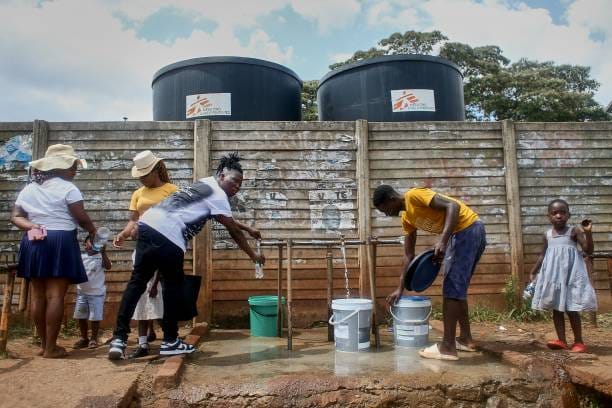NJELLE, Zambia — Stagnant pools of green water stand in the streets of this impoverished town in Zambia, some puddles reaching the walls of basic concrete homes in the Njele compound. Children play inches from the fetid water, unaware of the health risks lurking nearby. The situation is equally dire in Lilanda, a township on the edge of the Zambian capital, Lusaka, where the Banda family has paid a devastating price for the unsanitary living conditions.
In January, Mildred Banda lost her 1-year-old son, Ndanji, to cholera and rushed to save her teenage daughter within two days. Cholera, a disease that is easily treated and prevented, should not be claiming lives in 2024. Yet, Ndanji’s death underscores the ongoing vulnerability of many Zambians to this disease.
“When he fell sick with diarrhea, he was treated with an oral rehydration solution at a clinic and released. He slipped back into dehydration that night at home. Banda feels terrible guilt. ‘I should have rushed him back to the hospital as soon as I realized that he was sick instead of staying with him at home,’ she says, sitting in her tiny house. ‘Staying at home for the whole day into the night is the reason why my child died,’ she adds.
Residents of these townships blame the government for not doing more to clean the streets. ‘When you look at here in Njele shanty compound, it is full of water and children play in this dirty water barefoot. That is why the issue of cholera will continue in Njele compound because there are diapers with feces all over the place,’ says local Elias Banda. ‘When the council comes here they only look at the taps and check our water bills, and not address the sewage problem in the area,’ he adds.
Cholera outbreaks have hit Malawi, Zambia, Zimbabwe, Mozambique, Kenya, Ethiopia, and Somalia hard in recent months. These countries have faced either floods or drought, and health authorities, scientists, and aid agencies say the surge in cholera cases in Africa illustrates how weather drives disease outbreaks.
Zimbabwe and Zambia have seen cases rise amid severe droughts, forcing people to rely on unsafe water sources. In Kenya and other parts of East Africa, cholera cases appeared just days after deadly flooding. The World Health Organization (WHO) calls cholera a disease of poverty, thriving where there is a lack of clean water and poor sanitation. It mainly affects Africa and South Asia, while it’s irrelevant in the developed world.
Africa’s vulnerability is exacerbated by the worst impacts of climate change and the El Niño weather phenomenon, according to health experts. The situation is worsened by a global shortage of cholera vaccines, which are needed only in poorer countries. The doses that might have saved Ndanji started arriving in mid-January. He died on January 6.
In Zimbabwe, a drought worsened by El Niño has seen cholera take hold in both distant rural areas and crowded urban neighborhoods. Tracy Dzinoreva from Harare, who has been vaccinated, lives in fear that cholera could return because the root cause—lack of clean water and sanitation—has not been addressed. ‘Nothing has changed. We don’t have safe, clean water, and sewage is still flowing everywhere; the situation remains the same,’ she says.
Augustine Chonyera, from a cholera-prone area in Harare, was shocked by the impact of the disease in the rural district of Buhera. He heard grim tales of families losing multiple members and local businesses using delivery trucks to take the sick to clinics miles away. ‘What I think is the best is instead of having more money elsewhere let’s channel it to local governance. We know our pipes underground are dilapidated and breaking; they should repair those pipes and put in new ones for water and sewer,’ he says.
The cholera outbreaks in Zambia and other African countries highlight the urgent need for improved sanitation and access to clean water. Until these fundamental issues are addressed, the cycle of disease and loss will continue to plague vulnerable communities.
https://www.africanexponent.com/cholera-crisis-in-zambia-urgent-need-for-clean-water-and-sanitation/


